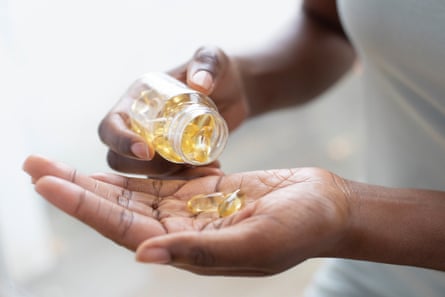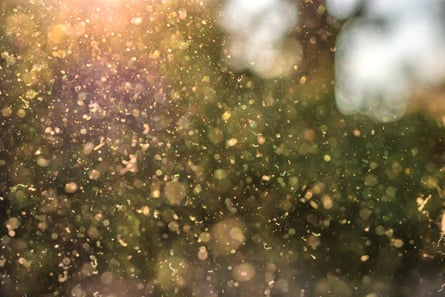If you’ve found yourself reaching for the tissues more than usual recently, you’re not alone. The sun has shown its face a bit, and thanks to the arrival of a tree pollen bomb, which occurs when groups of trees release millions of grains of pollen at the same time, many of us are trading the joys of spring for itchy eyes and streaming noses.
According to Margaret Kelman, acting head of clinical services at Allergy UK, the number of people affected by hay fever has trebled in the last 30 years, with the condition now affecting one in four adults in the UK. “Climate change, including increased air pollution, has contributed to more intense pollen seasons,” she says. “Warmer weather speeds up the growing process, causing pollen seasons to start earlier and last longer.”
As well as wreaking havoc on people’s immune systems, air pollution can increase an allergen’s effects, as the pollen tries to protect itself from contamination. “For someone affected by hay fever, this will mean longer periods of exposure to more concentrated, highly allergenic pollen particles and potentially worsening symptoms of hay fever,” says Kelman.
Dr Poonum Wilkhu, a pharmacist working in a prescribing role at a GP surgery in High Wycombe, is one of many clinicians who have seen a rise in the number of people with hay fever in the past month. “Symptoms starting in late February aren’t entirely unusual,” she says. “This is because tree pollen is the first type of pollen that appears. We then start to see more grass and weed pollen released from late March to mid-May. The rains and intermittent warmth along with humidity and windy conditions can make hay fever symptoms even worse.”
Many people find they can treat mild hay fever by taking the occasional antihistamine tablet. But for others, effects can be severe, and greatly reduce their quality of life. So how can you survive hay fever season? Here are some top tips from experts.
Monitor the pollen forecast
Dr Milli Raizada, GP and senior clinical lecturer at Lancaster University, recommends that sufferers keep a close watch on the pollen forecast. “Two weeks before anticipated high pollen counts, preventive, non-drowsy antihistamine tablets or sprays work well,” she says.
“For people who suffer with more severe symptoms, steroid sprays can help to reduce inflammation, while other treatments such as saline nasal irrigation, nasal decongestants and steroid tablets are sometimes appropriate short-term. Your GP or pharmacist should be able to suggest the best treatments for you.”
When especially high pollen counts are predicted, people may wish to avoid going outdoors until levels reduce.

Take vitamin D
Many people are still suffering the after-effects of colds or flu at this time of year, which can affect their immune systems. “This may influence how the immune response ‘overreacts’ to an allergen and may explain the exacerbated symptoms we are seeing,” says Wilkhu.
“It’s important to check your vitamin D levels if you’re suffering badly with hay fever. We have just come out of winter with minimal sun exposure, which means that individuals who have not been supplementing with vitamin D could very well have low levels. Given that vitamin D plays a critical role in maintaining a healthy immune system, getting these checked by a clinician could be helpful.”
For mild to moderate symptoms, head to your local pharmacy for over-the-counter treatment. But for moderate to severe symptoms, Wilkhu recommends seeing a GP or pharmacy clinic to rule out other conditions such as infective rhinitis, polyps or, in very rare cases, cancers. “For extremely severe symptoms, referrals for immunotherapy may be possible,” Wilkhu says.

Get cleaning
Aside from medication, Wilkhu suggests changing clothes regularly, showering after coming home and vacuuming and dusting as much as possible, to keep pollen at bay. “The early hours of morning and evening are peak pollen times, so windows and doors can be kept shut at these times,” she says.
Maintain a healthy diet
Family history, environmental factors and other allergies might increase your risk of suffering from hay fever, but a growing body of research suggests our diets could influence the severity of symptoms. Hannah Hope, a women’s health nutritionist, says that one 2016 study showed diets high in antioxidants were found to reduce the nasal symptoms of hay fever.
“Seasonal allergic rhinitis is an inflammatory disorder and vitamin C can reduce tissue inflammation,” she says. “Another small study from 2003 indicated that higher intakes of vitamin E and EPA, which is an omega-3 acid, were protective against hay fever and decreased the risk of adults developing it.”

The link between diet and allergies is a theory that Raizada supports. “Anecdotally, some people find a diet rich in omega-3 and anti-inflammatory foods can be beneficial – such as garlic, local honey, blueberries and oily fish. Foods rich in dairy and refined sugars can raise cortisol and histamine levels and worsen the inflammatory reaction associated with hay fever.”
Connect with others
Another emerging area of research is the link between hay fever and depression. According to psychotherapist Katy Georgiou, seasonal affective disorder, which has been known to cause low mood in winter, is becoming increasingly common in spring. “I encounter a lot of clients who feel really low as the days get longer and lighter. Some studies have shown a potential link between depression and hay fever, but it’s not yet fully clear what that correlation is,” she says.
“However, bad hay fever symptoms, like any other ailment, can lead to low mood, especially if people feel they are missing out on fun outdoor activities. My advice would be not to pressure yourself to go and keep busy during the spring. If your body needs to rest, it may be that your productive months might be in the autumn or winter. Traditionally, we are encouraged to go out and do more when the weather gets warmer, but nobody should feel pressured to do that if it doesn’t feel right for them and their bodies.”

For anyone who feels stuck indoors, she recommends building connections with others online. “If done safely, social media can be a great place to meet others who have the same experiences with severe allergies as you,” she says. “Finding your tribe can help you to find new tips for managing symptoms, as well as building new relationships.” Simple measures such as eating well, getting plenty of sleep, talking to a professional and putting your wellbeing first are also important, especially if the symptoms are affecting your mood and energy.
Try alternative therapies
Some practices offering alternative or complementary therapies, such as reiki, acupuncture and herbal medicine, claim these can improve symptoms. There is a lack of peer-reviewed evidence for their success, but Wilkhu says they could be effective for some people. “If you do decide to take herbal medications or other complementary therapies, just be aware that, like allopathic medication, they can also have side effects, some of which can be severe. I recommend informing your clinician if you’re going to try any other therapies.”

